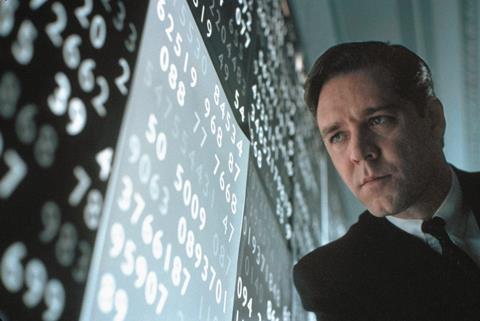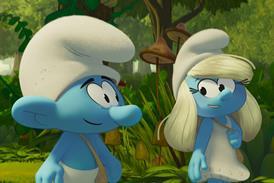Dir: Ron Howard. US. 2001. 134mins.

As is the case with every Ron Howard film, a hopeful, earnest, middle-brow sensibility informs his new bio-picture, A Beautiful Mind, the intensely dramatic story of genius mathematician John Forbes Nash Jr, whose brilliance was undermined by a life-long battle with schizophrenia. Continuing the career high that began with his Oscar-nominated role in The Insider, to be followed by a Best Actor Oscar for Gladiator, Russell Crowe renders a bravura performance as the eccentric academic in a role that is likely to garner him another nomination (perhaps even a second Oscar).
The film’s best chapters are the domestic ones, offering a chronicle of how Nash fights back with the help and renunciation of his loyal wife
Despite problems of structure and tone, and some crucial omissions from Nash’s actual life, ABeautiful Mind has emerged as one of the season’s most enjoyable and popular films. Opening the film in the US on Christmas Day and then widening its exposure has proved to be a savvy marketing move for this Universal release, which is now playing on 1,853 screens and will go wider if it sustains its initial commercial appeal. So far it has amassed an impressive $38.2m and will easily cross the $100m mark.
Although critical response has been mixed, A Beautiful Mind is a front-runner in the wide-open Oscar derby this year. It is likely to be nominated in at least eight categories, including Best Picture, Director, Screenplay, Actor and Supporting Actress for Jennifer Connelly, as Nash’s loyal wife, whose presence is the toughest, most exciting thing about a feature that otherwise suffers from an overdose of sentimentality, particularly during its last reel.
It’s rare to see an American film that captures vividly and realistically the internal workings of academic life. Last year, Curtis Hanson’s Wonder Boys, with Michael Douglas as an English literature professor-writer, was an artistic hit but commercial failure. In this respect, Howard and screenwriter Akiva Goldsman should be commended for conveying vital information about campus life (professorships, competition, tenure) in a vivid manner without overwhelming the viewers with dry details (such as mathematical equations or scientific discoveries) that defy visual dramatisation.
In 1947, a young, handsome scientist named Nash arrives at Princeton to begin graduate study in mathematics. In the first reel, audiences feel the precarious position of Nash, soon labelled “the mysterious West Virginia genius,” due to his lack of prep school legacy, old money or blue blood, all of which are crucial variables in facilitating a young scientist’s entry into the Ivy League. At that point in his career, all that Nash has going for him is belief in his talent and a certain attitude: call it chuzpah.
An outsider par excellence, Nash also lacks finesse or any manners; social niceties mean nothing to him. Neither does classroom attendance, and instead he spends hours in the library and in his dorm obsessing about one thing: how to find and execute a truly original and brilliant idea. That Princeton’s math department is brutally competitive, and that his classmates would love nothing more than to see him fail, only makes Nash even more ambitious.
There’s a wonderful moment in which the aloof Nash is with his classmates in a local bar, when their reaction to a hot blonde girl grabs his attention. As Nash observes their rivalry, the idea that has been long haunting him bursts into focus. Nash’s resulting paper on game theory - the math of competition - boldly contradicts the doctrine of Adam Smith, the father of modern economics. Smith’s arguments, which have been widely accepted for more than a century, are now abruptly rendered outdated and Nash’s life forever changes. In one of those truly rare cinematic occasions, audiences are exposed to the origins of creativity and its effects on one man’s psyche.
Nash subsequently wins a coveted research and teaching post at the Massachusetts Institute Of Technology (MIT), but he’s still frustrated and unfulfilled. Science had played a huge role in bringing about America’s triumph in WWII, and now, as the Cold War rages, he yearns to play a strategic role in the new environment. It’s in this turbulent era that Nash’s wish is granted when he meets William Parcher (Harris), a shadowy CIA officer who recruits him for a top-secret assignment as an enemy code-breaker.
All of these activities are unbeknown to his wife, Alicia Larde (Connelly), a former physics student who introduces Nash to a “novel” idea that is utterly missing from his life up until then - love. Although their marriage is good, Nash can’t confide in Alicia the dangerous project he’s involved in. But soon, the work, secrecy and risk begin to take their toll on his family and on his health. He becomes furtive, obsessive and lost in a world of dark delusions - until it becomes clear to his wife and his doctors that the mental illness he’s suffering from is paranoid schizophrenia.
Inspired by events in the life of Nash, as described in Sylvia Nasar’s book, the script details the quick ascendance of its subject, and particularly the tragedy of a scientist who makes an astonishing discovery early in life which almost - but not quite - catapulted him to international acclaim. Unfortunately, Nash’s white-hot climb into the intellectual stratosphere takes a drastic turn when his intuitive acumen is hampered by severe schizophrenia.
The film’s best chapters are the domestic ones, offering a chronicle of how Nash fights back with the help and renunciation of his loyal wife, facing challenges that have destroyed other patients. Although burdened by demons for the rest of his life, Nash is determined to find his own kind of “normalcy,” willing to combat a disease thought to be incurable and degenerative. Through sheer will power and drive, motivated by the intoxicating demands of mathematical theory, Nash continues his work, and in 1994 received the Nobel Prize that had earlier eluded him. By that time, Nash’s insightful work in game theory had become one of the 20th century’s most influential ideas. His celebrity status and triumphant battle has turned him into a legendary man who continues to pursue his work today.
In his screenplay, which represents a major step forward compared with his previous assignments (Batman And Robin, Lost In Space), Goldsman has decided not to render a literal telling of Nash’s life but to delineate the architecture of his existence. Hence, Beautiful Mind is billed as a semi-fictional story, with Goldsman receiving a “written by” rather than “screenplay by” credit from the Writers Guild of America. But some of the tale’s omissions are glaring and peculiar, specifically Nash’s homosexual experiences. There’s only one brief scene in the film, in which the young Nash exchanges a “look” with another guy in Princeton’s halls, but no references are made to his sexuality while he was married.
This problem wouldn’t have mattered much if Howard’s direction were more subtle and nuanced. Howard is an entertainer with roots so deep in commercial TV and movies that the artist in him still struggles to come out. It may be unfair to suggest, but his films still betray his origins on The Andy Griffith Show and Happy Days. In Apollo 13 and ThePaper, two vintage Howard works, he took messy situations and turned them into genial, uniquely American celebrations.
Not helping matters is Howard’s insistence on underlying every emotion for his viewers, neatly resolving situations and crises that call for ambiguity and untidiness, notions that simply don’t exist in




![Benjamin Kramer Headshot Photo Credit_CAA[40][40]](https://d1nslcd7m2225b.cloudfront.net/Pictures/274x183/6/6/4/1455664_benjaminkramerheadshotphotocredit_caa4040_107707.jpeg)

















No comments yet